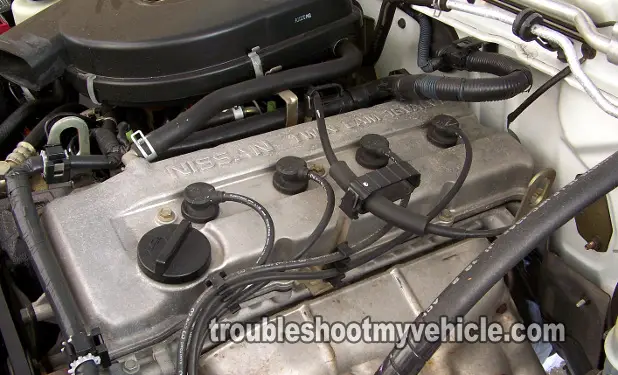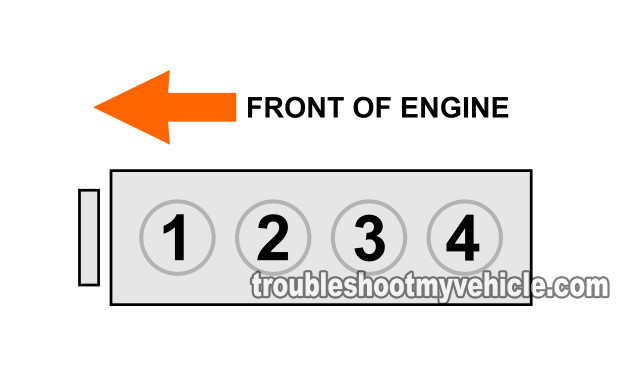
In this tutorial, I'm gonna' show you one of the fastest and easiest ways I have used to diagnose bad fuel injectors on Nissan vehicles.
You don't need any expensive diagnostic equipment to do it. All you need is a multimeter to do a simple fuel injector resistance test (to diagnose a fried fuel injector).
Contents of this tutorial:
Symptoms Of A Bad Fuel Injector
In my experience, the three major causes of a fuel injector fault/problem are:
- Fuel injector doesn't spray any fuel.
- Fuel injector sprays fuel, but not enough (clogged fuel injector).
- Fuel injector stuck ON all of the time (as soon as the key is turned ON).
This tutorial focuses on the most common, which is when the fuel injector doesn't spray any fuel at all. When this happens, it's because the fuel injector has fried internally.
What really stinks about having a fuel injector go bad, or get clogged, or stay stuck ON all of the time, is that the PCM (Powertrain Control Module = Fuel Injection Computer) doesn't set a specific fuel injector malfunction trouble code.
So, one of the things that you and I have to do, when we suspect a bad fuel injector, is to do a fuel injector resistance test.
What Tools Do I Need To Test The Fuel Injectors?
Here's a basic list of tools you'll need to test the fuel injectors of your 2.4L equipped Nissan Altima, or Frontier, or Xterra:
- A multimeter.
- You'll only be using the multimeter to check resistance (Ohms).
- If you need to upgrade or buy a multimeter, check out my recommendation: Buying A Digital Multimeter For Automotive Diagnostic Testing (found at: easyautodiagnostics.com).
- Scan tool.
- To actually test the fuel injectors, you don't need a scan tool (since a scan tool can't dynamically test the fuel injectors). But, having one makes the whole process easier since you're able to retrieve any diagnostic trouble codes (DTCs) stored in the PCM memory.
- Don't have one? Check out my recommendation: Actron CP9580 Scan Tool Review.
- Pen and paper to write down your fuel injector resistance test results.
The Fuel Injector Test

To get the most accurate test result, from the info presented in this article, you need to test the fuel injectors on your Nissan Altima (or Frontier, Xterra) with the engine warmed up.
Now, in case your car cranks but doesn't start, doing a fuel injector resistance test probably won't help you. If this is your situation, take a look at this section of this tutorial: My Nissan Doesn't Start.
You'll be using the illustration above to know what fuel injector belongs to what engine cylinder.
OK, this is what you need to do:
- 1
Disconnect all 4 fuel injectors from their electrical connectors.
- 2
Test the resistance of each one with your multimeter in Ohms mode. You'll do this by probing the male spade terminals inside the fuel injector with the multimeter's test leads.
- 3
Write down the Ohms number (value) that your multimeter registered on a piece of paper. Use the illustration above to write down the cylinder number this reading belongs to).
- 4
Repeat test steps 1 through 3 on the remaining 3 fuel injectors.
OK, let's interpret the results of your fuel injector resistance (Ohms) readings:
CASE 1: All of the multimeter resistance values are nearly identical. This result indicates that the fuel injectors are not fried internally and are not causing the misfire code or condition.
Now, your vehicle may still be misfiring, so my suggestion to you is to check that each cylinder is getting spark and that each has good compression. The following tutorial will help you do (and interpret) the results of an engine compression test:
CASE 2: One of the 4 multimeter resistance values is drastically different. The fuel injector that registered the drastically different resistance value is bad and needs replacement.
Now, to be a little more specific, let's say that you got the following resistance values:
- Cylinder 1: 12.6 Ohms (similar).
- Cylinder 2: 12.4 Ohms (similar).
- Cylinder 3: 12.7 Ohms (similar).
- Cylinder 4: 8.6 Ohms (different).
Cylinder 4 is the one that is fried, since the resistance value is too great to be considered similar to the other three. Keep in mind that the above values are the ones that you are gonna' see on your specific Nissan vehicle, I'm using them to illustrate what differences you should be looking for.
